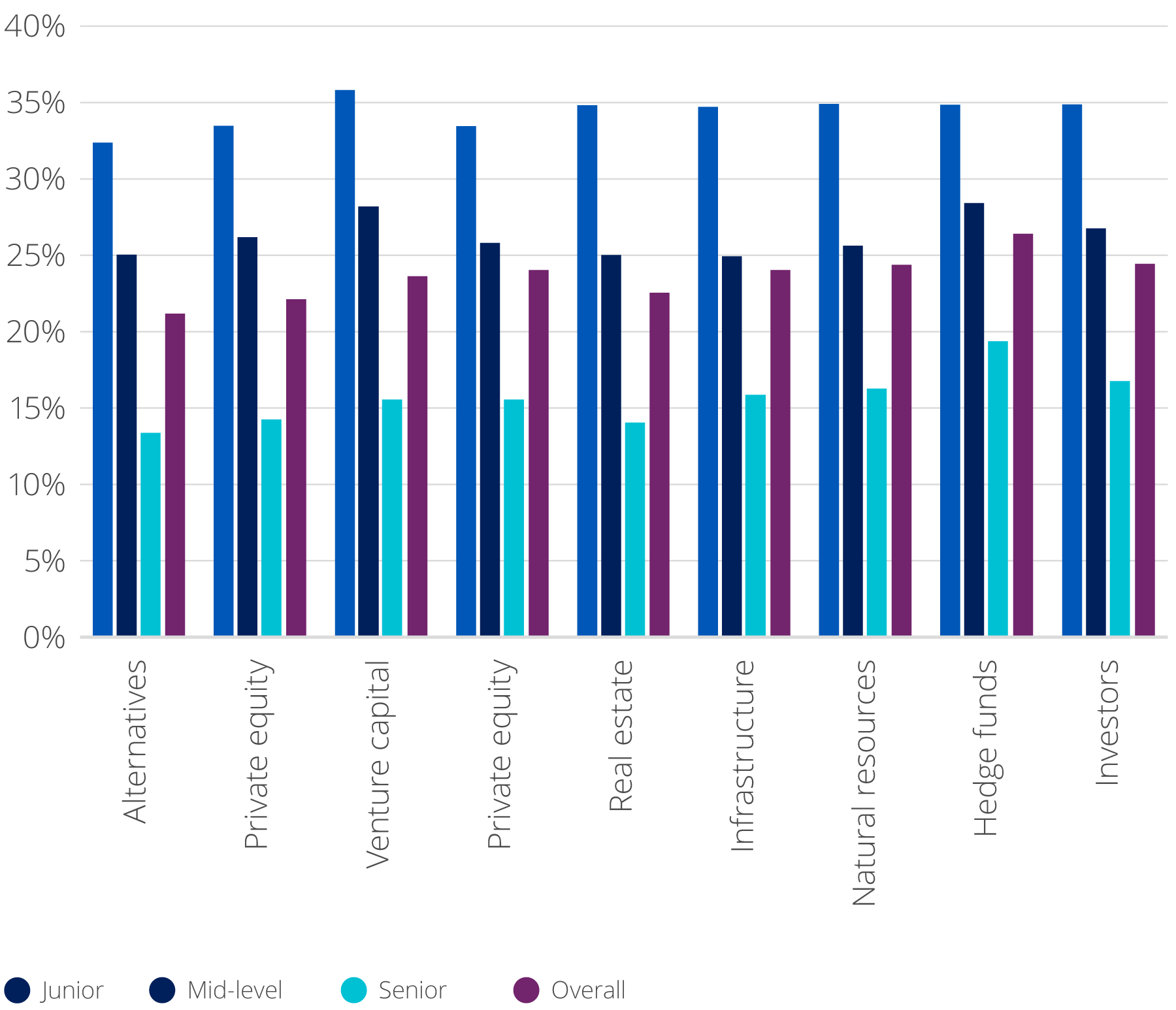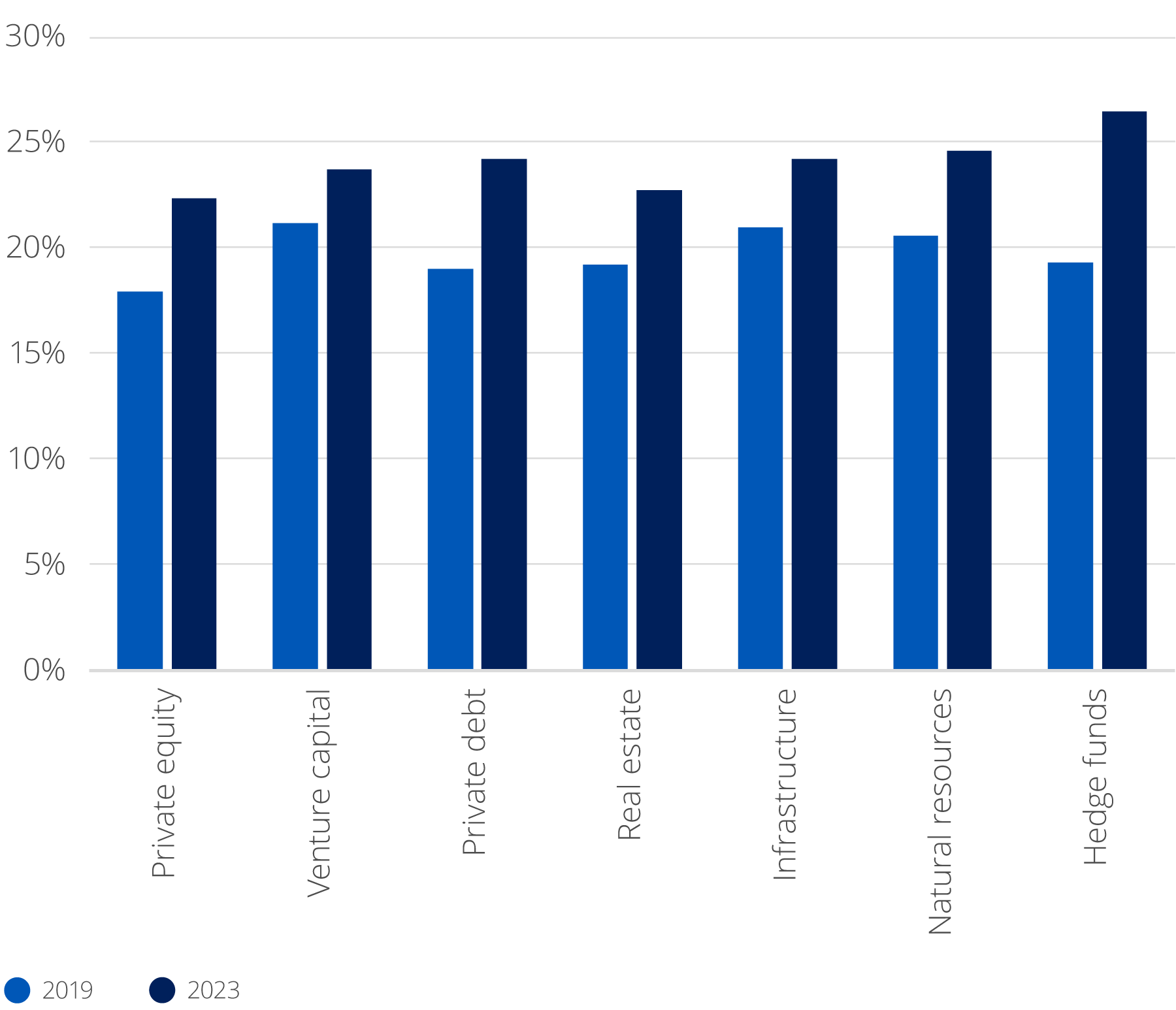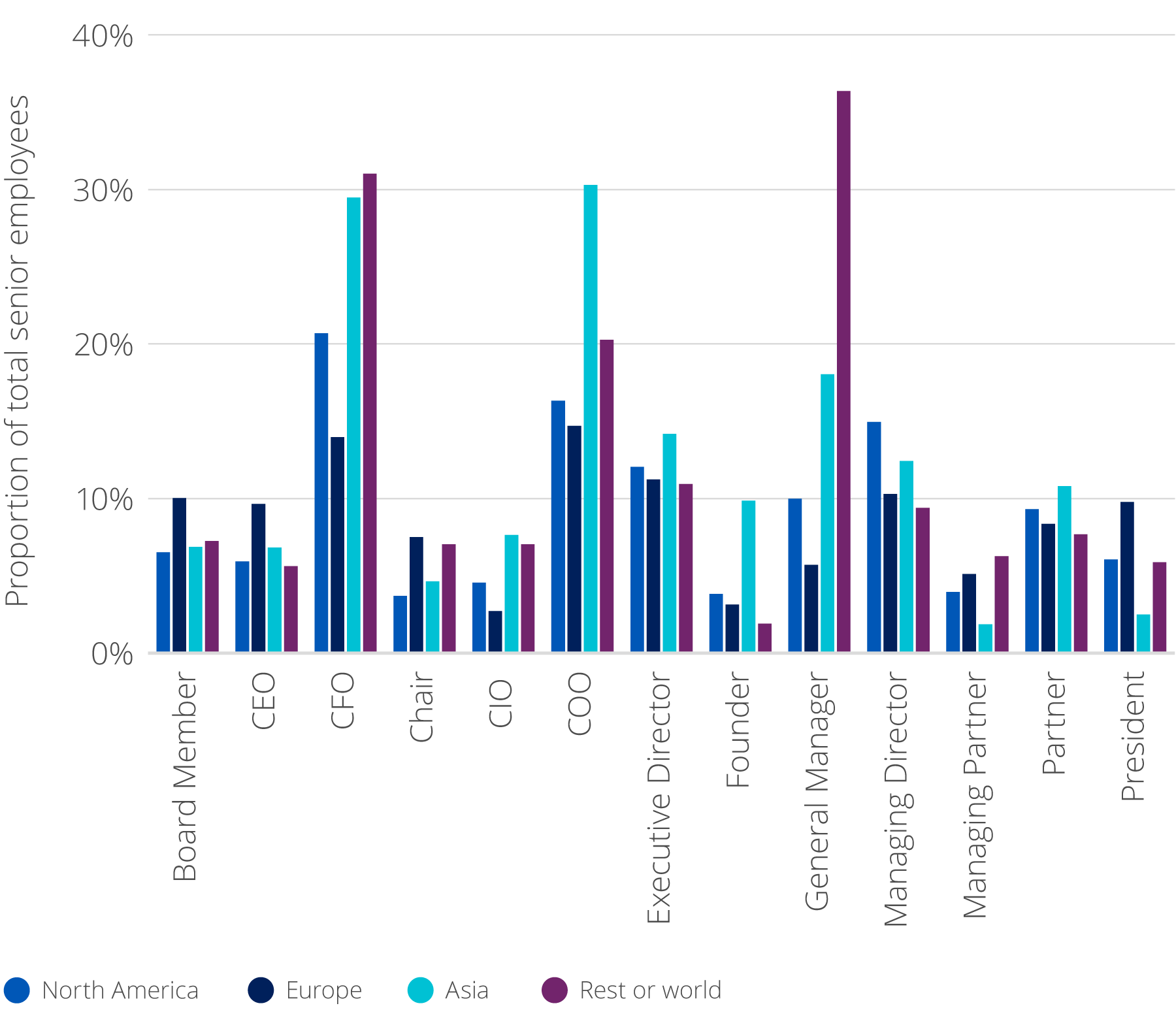We've long heard that diversification is the only "free lunch" in town; this is largely accepted as one of the few key tenets of investing that we can agree on. For the most part we have quantitative methods by which we can measure diversification: efficient frontiers, correlation matrices, value at risk measures, and others. But what about non-quantitative forms of diversification?
As we think about different ways in which we can source diversity of thought, gender diversification is paramount on that list. Let's start by exploring current figures highlighting women in the alternative industry today.1
Women in alternatives today
Women represent only 21.3%of people working in the alternatives industry. At senior levels this number falls to 13.6%
Figure 1: Female employees in alternatives as a proportion of total employees by seniority & asset class

Source: Preqin, ‘23
Within hedge funds specifically, the % of women rises to 26.5%, up 7.2% over the last four years
Figure 2. Female employees in alternatives as a proportion of total employees by asset class, 2019 vs 2023

Source: Preqin, ‘23
Women, however, remain under-represented in investment decision-making roles, such as investment process, trading and portfolio management at 21.9%.
Figure 3. Women in senior roles at hedge funds as a proportion of all senior positions, by role and region

Source: Preqin, ‘23
As a result, hedge funds run by white men at executive or partner levels are estimated to manage 97% of the industry's investments
High levels of diversification can lead to higher levels of performance
There are clearly social and ethical arguments for fostering women-owned and/or managed hedge funds as well as an enormous amount of well-documented evidence supporting the benefits of diversity within any team. More perspectives lead to higher quality decision making, better ability to attract and retain talent, and improved business results and longevity. We're not suggesting that women are better or worse investors than men. On the contrary, men and women are different, and it's those differences that create another vantage point when seeking to achieve diversified portfolios.
Outside of the social case, there is also increasing evidence of a supportive investment case as well. A 2021 study conducted by Goldman Sachs found that 48% of female-managed hedge funds beat the market between the market low in March 2020 through to August 2021 – compared to 37% of male-led funds.3 Studies by HFR over longer periods reflect the same picture, with women-managed funds outperforming their male peers between the dot-com crash of January 2000 and the end of the global financial crisis in May 2009.
Introducing a quality premium
But what explains the relative outperformance of women-managed funds versus the aggregate hedge fund benchmarks? We would argue that a positive selection bias impacts the benchmarks that track women-managed hedge funds, which partially explains this outperformance. Because of the challenges that women in finance have had to contend with, relative to men, there is a quality premium built into women-led funds and benchmarks. To be successful, women have had to be disproportionately as talented as their male counterparts to reach the same level. So, for a woman to have reached the point of launching a fund, hiring a team, building a business, raising capital, this means they are likely to be exceptional and driven investors – above those of the more diluted talent pool of male-led funds.
As it relates to the social and ethical case to be made, fostering women-managed funds in the industry is a critical step in the right social direction. It seems that the most direct way to correct this inequality on the buy-side - and reap the potential benefits from diversification - is to consciously and actively invest in women and be a catalyst for change. The prospect of an active investment in women-managed funds will also encourage the ushering in and promoting of women into senior positions, as it will increase the likelihood that the fund will receive a diversity inflow. Does it matter why a woman is promoted into a more senior role? Maybe it does. But in the short run we need change, and getting more women in those senior seats is a great start.
Screening, sourcing, filtering, diligencing, and investing in hedge funds is difficult and time consuming. Simply identifying or sourcing funds managed by women has proven challenging. Further, once these funds are identified, after investment due diligence, operational due diligence and all other steps in the investment process, the resulting fund that makes it through the process will ultimately receive an allocation. And that's great. But how much social good does that approach actually achieve? The women-led fund that makes it through the process is likely already at critical mass and has “made it”. Smaller, more emerging women-managed funds are the groups that could really benefit from a larger asset base, and they will likely be screened out earlier in the process due to inadequate AUM or other considerations.
A more prudent path
For all the reasons highlighted, we feel a passive approach to supporting women-managed hedge funds is the most prudent path from both a performance and social perspective. Using this passive approach should address a number of issues while producing a variety of benefits:
- Speed to market: Begin making a social impact and allocating capital considerably more quickly than what would be the case if sourcing, diligencing, negotiating and structuring funds on an individual basis.
- Impact: Be the catalyst for change: Having a passive, rules-based approach focused on inclusion will encourage the promotion of women into senior positions at hedge funds.
- Address the target market/avoid size bias: Gain access to firms/funds that are smaller and may not otherwise be eligible for an allocation.
- Immediate diversification: Reduce idiosyncratic/single manager risk and gain diversification considerably more quickly than through allocations to individual funds. While this concept is fairly obvious, the performance of female-focused programs will be an area of interest for the outside world. Thus, a targeted solution aimed at reducing the risk of an individual fund's underperformance, undermining the overall exercise in the eyes of skeptics.
We are therefore advocating that institutional investors bring the diversity progress from their own hiring practices to those of external providers, while sending a message to the wider investment community that this issue is to be taken seriously. We challenge investors to be pioneers and thought leaders in hedge fund diversity at this critical time.
Sources:
1 Preqin – Women in Alternatives 2023 report
2 “Hedged Out: Inequality and Insecurity on Wall Street” by Megan Tobias Neely, Associate Professor - Department of Organization at Copenhagen Business School and a former postdoctoral fellow at the Clayman Institute.
3 GS Diversity Report, March 2022
Important information
Important information for all audiences: abrdn offers a variety of products and services intended solely for investors from certain countries or regions. Your country of legal residence will determine the products or services that are available to you. Nothing in this document should be considered a solicitation or offering for sale of any investment product, service, or financial instrument to any person in any jurisdiction where such solicitation or offer would be unlawful.
The information contained herein is intended to be of general interest only and does not constitute legal or tax advice. abrdn does not warrant the accuracy, adequacy or completeness of the information and materials contained in this document and expressly disclaims liability for errors or omissions in such information and materials. abrdn reserves the right to make changes and corrections to its opinions expressed in this document at any time, without notice.
Some of the information in this document may contain projections or other forward-looking statements regarding future events or future financial performance of countries, markets or companies. These statements are only predictions and actual events or results may differ materially. The reader must make his/her own assessment of the relevance, accuracy and adequacy of the information contained in this document, and make such independent investigations as he/she may consider necessary or appropriate for the purpose of such assessment.
Any opinion or estimate contained in this document is made on a general basis and is not to be relied on by the reader as advice. Neither abrdn nor any of its agents have given any consideration to nor have they made any investigation of the investment objectives, financial situation or particular need of the reader, any specific person or group of persons. Accordingly, no warranty whatsoever is given and no liability whatsoever is accepted for any loss arising whether directly or indirectly as a result of the reader, any person or group of persons acting on any information, opinion or estimate contained in this document.
Diversification does not ensure a profit or protect against a loss in a declining market.
The HFR Women Access Index comprises of hedge funds with primary female risk-takers. Performance of the index does not take into account hedge funds that closed prior to the inception of the index. Had those hedge funds been included, the performance of the index may be lower. You cannot invest directly in an index. Performance of the index is subject to revision for a period of four months as HFR receives updates from lagged funds.
Hedge funds use sophisticated investment strategies that may increase investment risk in your portfolio. Among the risks presented by hedge fund investments are: the use of unregistered investments, which may make it difficult to assess the performance of the holding; risky investment strategies, which may result in significant losses; illiquid investments that may be subject to restrictions on transferability and resale; and adverse tax consequences.
Alternative investments involve specific risks that may be greater than those associated with traditional investments; are not suitable for all clients; and intended for experienced and sophisticated investors who meet specific suitability requirements and are willing to bear the high economic risks of the investment. Investments of this type may engage in speculative investment practices; carry additional risk of loss, including possibility of partial or total loss of invested capital, due to the nature and volatility of the underlying investments; and are generally considered to be illiquid due to restrictive repurchase procedures. These investments may also involve different regulatory and reporting requirements, complex tax structures, and delays in distributing important tax information.
In the United States, abrdn is the marketing name for the following affiliated, registered investment advisers: abrdn Inc., abrdn Investments Limited, abrdn Australia Limited, abrdn> Asia Limited, Aberdeen Capital Management, LLC, abrdn ETFs Advisors LLC and abrdn Alternative Funds Limited.
AA-100523-162594-1